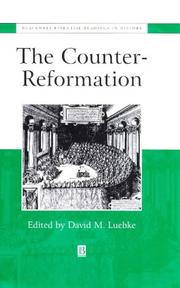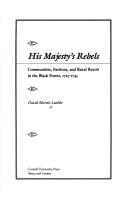| Listing 1 - 5 of 5 |
Sort by
|

ISBN: 0631211047 0631211039 Year: 1999 Publisher: Malden Blackwell
Abstract | Keywords | Export | Availability | Bookmark
 Loading...
Loading...Choose an application
- Reference Manager
- EndNote
- RefWorks (Direct export to RefWorks)
Christian church history --- anno 1600-1699 --- anno 1500-1599 --- 27 "15/19" --- Counter-Reformation --- Anti-Reformation --- Church history --- Church renewal --- Reformation --- Kerkgeschiedenis--?"15/19" --- Counter-Reformation.

ISBN: 0801433460 Year: 1997 Publisher: Ithaca Cornell University Press
Abstract | Keywords | Export | Availability | Bookmark
 Loading...
Loading...Choose an application
- Reference Manager
- EndNote
- RefWorks (Direct export to RefWorks)
Book
ISBN: 9780813938400 9780813938417 0813938414 0813938406 Year: 2016 Publisher: Charlottesville
Abstract | Keywords | Export | Availability | Bookmark
 Loading...
Loading...Choose an application
- Reference Manager
- EndNote
- RefWorks (Direct export to RefWorks)
The pluralization of Christian religion was the defining fact of cultural life in sixteenth-century Europe. Everywhere they took root, ideas of evangelical reform disturbed the unity of religious observance on which political community was founded. By the third quarter of the sixteenth century, one or another form of Christianity had emerged as dominant in most territories of the Holy Roman Empire. In "Hometown religion: Regimes of coexistence in early modern Westphalia, " David Luebke examines a territory that managed to escape that fate the prince-bishopric of Munster, a sprawling ecclesiastical principality and the heart of an entire region in which no single form of Christianity dominated. In this confessional "no-man's-land," a largely peaceable order took shape and survived well into the mid-seventeenth century, a unique situation, which raises several intriguing questions: How did Catholics and Protestants manage to share parishes for so long without religious violence? How did they hold together their communities in the face of religious pluralization? Luebke responds by examining the birth, maturation, old age, and death of a biconfessional "regime" a system of laws, territorial agreements, customs, and tacit understandings that enabled Roman Catholics and Protestants, Lutherans as well as Calvinists, to cohabit the territory's parishes for the better part of a century. In revealing how these towns were able to preserve peace and unity in the Age of Religious Wars "Hometown religion" attests to the power of toleration in the conduct of everyday life."
History of Germany and Austria --- Christian church history --- anno 1600-1699 --- anno 1500-1599 --- Westphalia --- RELIGION / Christianity / History. --- HISTORY / Europe / General. --- 1500-1699. --- Münster (Ecclesiastical principality) --- Europe --- Church history --- Religion / christianity / history. --- History / europe / general. --- Münster (Ecclesiastical principality --- Münster (Ecclesiastical principality) --- Münster (Niederstift) --- Niederstift Münster --- Hochstift Münster --- Fürstbistum Münster --- Fürstentum Münster
Book
ISBN: 9781350253278 Year: 2024 Publisher: Bloomsbury Academic
Abstract | Keywords | Export | Availability | Bookmark
 Loading...
Loading...Choose an application
- Reference Manager
- EndNote
- RefWorks (Direct export to RefWorks)
The Empire's Reformations provides a concise overview of reform movements in 16th-century Germany that gave birth to the modern division of western Christianity into multiple denominations – Roman Catholic, Lutheran, Calvinist, and more. It exposes the origins of modern religious pluralism, both in battle for souls among these emerging camps and in the struggles of political leaders at every level to manage the threat that religious diversity posed to tranquillity and order in a rigidly hierarchical society. As such, it offers a prehistory of religious toleration, not as a positive value – few regarded toleration as inherently good – but as a strategy for keeping the peace.
Book
ISBN: 1280876050 9786613717368 0857453769 Year: 2012 Publisher: New York : Berghahn Books,
Abstract | Keywords | Export | Availability | Bookmark
 Loading...
Loading...Choose an application
- Reference Manager
- EndNote
- RefWorks (Direct export to RefWorks)
The Protestant and Catholic Reformations thrust the nature of conversion into the center of debate and politicking over religion as authorities and subjects imbued religious confession with novel meanings during the early modern era. The volume offers insights into the historicity of the very concept of ""conversion."" One widely accepted modern notion of the phenomenon simply expresses denominational change. Yet this concept had no bearing at the outset of the Reformation. Instead, a variety of processes, such as the consolidation of territories along confessional lines, attempts to ensure ci
Conversion --- Christianity and politics --- Christianity --- History of doctrines --- Germany --- Church history
| Listing 1 - 5 of 5 |
Sort by
|

 Search
Search Feedback
Feedback About UniCat
About UniCat  Help
Help News
News